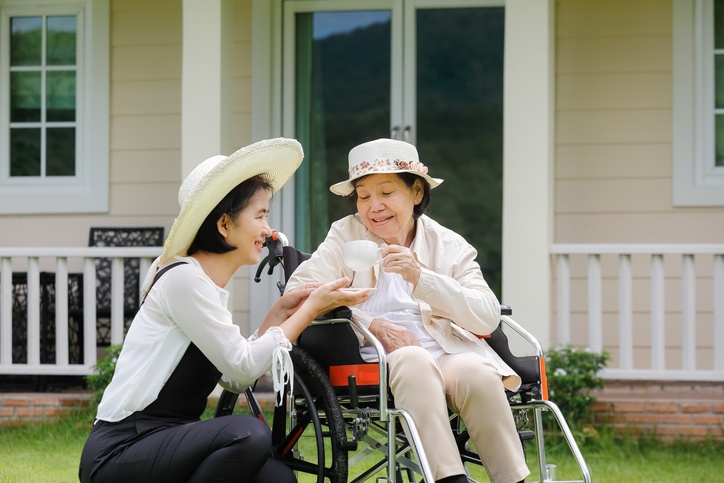The Joys & Challenges of Caregiving
Acting as a caregiver has many rewards. It's an opportunity to support someone that you love. It's a chance to practice patience, hone your listening skills, and express kindness and compassion. There can be moments of profound sharing, deep and honest conversations.
It's also true that being a caregiver can be really challenging. As you offer care to a friend or family member while they recover from a serious illness or injury -- or shepherd them through their final months within a hospice setting -- things won't always go smoothly. At times you may feel isolated and overwhelmed by all the details that need to be attended to. The person you're caring for may feel and express anger, impatience, resentment, frustration, or sadness: and perhaps lash out at you, or become sullenly withdrawn. You may feel uncertain about how to juggle the various practical tasks required -- while at the same time relating skillfully to your own emotional responses to the situation.
You're Not Alone!
The first thing to know is that you're not alone: Many families and individuals find themselves in the role of caregiver and need guidance on how best support their loved one, while at the same time maintaining a sense of healthy balance in their own lives. The good news is that there are steps and strategies for navigating skillfully the dynamics of a caregiving relationship. What follows are some tips to help you with each aspect of the process.
- Communicate effectively with doctors to improve healthcare outcomes. Make it a point to really get to know your healthcare team and remain fully engaged and interested in the various treatment options presented by them.
- Encourage collaboration among the various practitioners involved in your loved one's care. Build a mutual understanding of the overall treatment plan, and the roles and responsibilities of each member of the team.
- Be fully present -- relaxed and attentive -- when communicating with the medical team. Know them by name, and how best to reach them (e.g. by phone, email, text, or in person).
- Keep an online or hard-copy calendar devoted solely to tracking medical appointments. Record the dates, times, and locations (address/building/office) for check-ups as well as lab-work.
- Organize your documents. Become an organizational wizard -- keeping clear track of medical information, legal documents, and insurance claims. Be able to pull up a given document at a moment's notice.
- Accept help from family and friends. Let it be a community effort! Here are some ways that this can work:
- Create a daily and weekly list of tasks that need completing, that is shared with all who have offered to help. For instance, the list might include grocery shopping, preparing meals, laundry, housecleaning, yard work; carpooling or coverage so you can go to the gym or take care of personal task.
- Connect with social services or community programs such as Meals on Wheels.
- Create a care community via Lotsa Helping Handsor a similar online platform.
- Remember to take good care of your own health. Only when your own body and mind is healthy can you offer the highest quality of care to your loved one. It is important to find ways to take good care of yourself:
- Eat well and get adequate sleep
- Exercise daily: a walk around the block, a hike, a half-hour swim, a bit of afternoon gardening or a yoga class are all great options
- Pamper yourself with a hot bath, some fresh flowers, a professional massage, an ice cream sundae, or whatever makes you feel genuinely refreshed, inspired, and well-loved
- Seek the support of other caregivers or organizations, such as: (1) the general resources and the Georgia page of the Family Caregiver Alliance;or (2) this great list of 25 organizations that take care of caregivers.
- Take a Respite break. This service provides caregivers a break from their daily responsibilities and can cover a wide range of services based the needs of the individual caregiver.
If you can follow these general guidelines, your caregiving experience will likely be effective and fulfilling, for both yourself and your loved one. And as always, feel free to Church Home LifeSpring with questions on short term or long term care needs.

